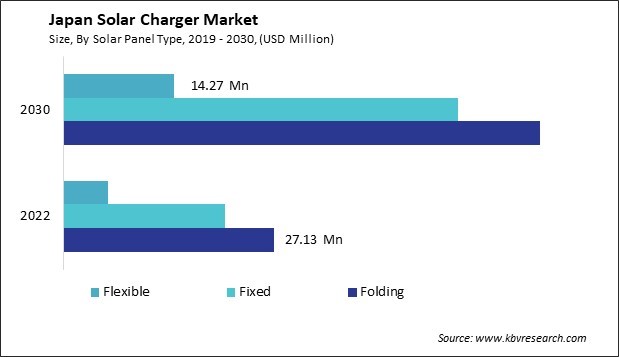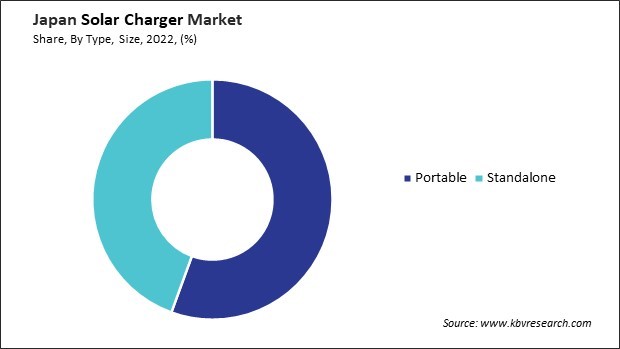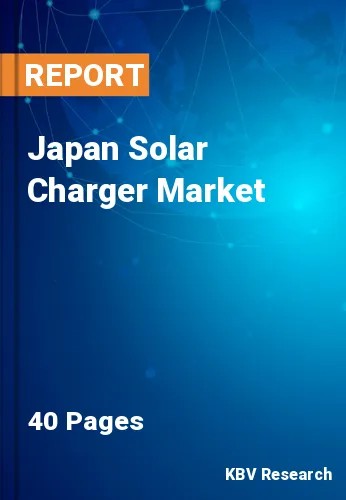The Japan Solar Charger Market size is expected to reach $126.92 Million by 2030, rising at a market growth of 11.5% CAGR during the forecast period.
The solar charger market in Japan has grown significantly over the past decade. One of the key drivers of the solar charger market in Japan is the country's ambitious renewable energy targets. Following the Fukushima nuclear disaster in 2011, Japan embarked on a journey to diversify its energy mix and reduce its reliance on nuclear power. As part of this transition, the government introduced generous incentives and subsidies to promote the adoption of solar power, both in large-scale installations and small-scale applications like solar chargers.

One of the key drivers of the solar charger market in Japan is the government's support through favorable policies and incentives. Initiatives such as feed-in tariffs (FIT) and solar power generation subsidies have encouraged residential and commercial consumers to invest in solar energy solutions, including solar chargers. These incentives have boosted the adoption of solar technology in Japan and fostered a competitive industry environment, leading to innovation and the development of more efficient and affordable solar chargers.
Furthermore, Japan's dense urban population and limited space have led to a growing demand for compact and portable charging solutions. Solar chargers offer a convenient way for urban dwellers to harness solar energy and charge their devices on the go, whether commuting to work, hiking in the mountains, or relaxing at the beach. Their portability and versatility make them particularly well-suited to the lifestyle needs of modern Japanese consumers.
The COVID-19 pandemic has also impacted the solar charger market in Japan. The global economic slowdown and disruptions in supply chains have posed challenges for the solar industry, leading to delays in manufacturing and distribution. Additionally, temporary closures of retail outlets and restrictions on outdoor activities have dampened consumer spending on non-essential items like solar chargers. However, the pandemic has also highlighted the importance of resilience and self-sufficiency, driving interest in off-grid energy solutions such as solar chargers.
In recent years, Japan has witnessed a significant surge in the popularity of hiking, driven by a growing interest in outdoor activities and a desire to reconnect with nature. According to the International Trade Administration, Japan's outdoor consumer goods industry in 2020 was about $4.45 billion. The "serious hiking" equipment industry accounts for approximately 10% of the outdoor industry. As more Japanese consumers embrace hiking as a form of recreation and adventure, they increasingly rely on technology to enhance their outdoor experiences, leading to a notable trend in the solar charger market.
One primary reason for the rising demand for solar chargers among hikers in Japan is the need for reliable power sources while exploring remote and off-grid locations. Traditional power outlets are often inaccessible in these areas, making solar chargers ideal for keeping essential electronic devices, such as smartphones, GPS devices, and cameras, charged throughout the journey. Additionally, the growing awareness of environmental sustainability influences consumers to seek eco-friendly alternatives to conventional energy sources.
Furthermore, advancements in solar technology have led to the development of lightweight, portable, and durable solar chargers specifically designed for outdoor use. Manufacturers in Japan are incorporating features such as rugged construction, weather resistance, and fast-charging capabilities to cater to the needs of adventure enthusiasts. Therefore, the surge in Japan's hiking popularity has fueled a demand for solar chargers, driven by the need for reliable power in remote areas and a growing environmental consciousness.
The solar charger market in Japan has experienced a notable surge in recent years, largely propelled by the increasing adoption of portable electronic devices across the country. Advancements in solar technology have played a significant role in driving the adoption of solar chargers in Japan. Innovations in solar panel efficiency, energy storage, and portable design have made solar chargers more practical and effective. Modern solar chargers efficiently convert sunlight into electricity, enabling users to charge their devices quickly and reliably even when moving.
One of the primary drivers behind the rising adoption of portable electronic devices in Japan is the country's tech-savvy population. Japan has long been known for its affinity for the latest gadgets and electronics, with consumers frequently upgrading their smartphones, tablets, and other portable devices to access the newest features and functionalities. According to the National Library of Medicine, in 2020, smartphone usage rates in Japan were 90.8% in 13–19 years old and 99.0% in 20–29 years old. Most Japanese teenagers and young adults, including university students generally aged 18–22 years, use their smartphones throughout the day. As a result, there is a consistent demand for reliable and convenient charging solutions to keep these devices powered throughout the day.
Moreover, Japan has a growing emphasis on sustainability and environmental conservation, leading many consumers to seek out eco-friendly alternatives to traditional charging methods. Solar chargers offer a renewable energy solution that aligns with these values, allowing Japanese users to harness the sun's power to charge their devices without relying on electricity from the grid or disposable batteries. Hence, the surge in Japan's solar charger market is fueled by tech-savvy consumers seeking convenient, sustainable charging solutions for their portable devices.

In Japan, the solar charger market has experienced significant growth in recent years, driven by factors such as the country's commitment to renewable energy, increasing environmental awareness, and a growing demand for portable charging solutions. One prominent player in the Japanese solar charger market is Panasonic Corporation. With a long history of innovation in electronics and renewable energy, Panasonic has established itself as a leading manufacturer of solar panels and related products. The company's solar chargers feature high-efficiency photovoltaic cells and compact, lightweight designs, making them ideal for powering smartphones, tablets, and other portable devices on the go. Panasonic's solar chargers are widely available in Japan through various retail and online platforms, catering to consumer and commercial customers.
Kyocera Corporation is also a significant player in the Japanese solar charger market. As one of the world's largest producers of solar panels, Kyocera offers a comprehensive range of solar products, including solar chargers for portable electronics. The company's solar chargers leverage Kyocera's expertise in photovoltaic technology to deliver high-performance charging capabilities in compact, lightweight packages. Kyocera's solar chargers are designed for use in diverse environments, from urban settings to remote outdoor locations, catering to the needs of consumers with different lifestyles and preferences.
Another notable player in the Japanese solar charger market is PowerFilm Solar. Founded in the United States, PowerFilm Solar specializes in flexible solar panels and portable solar chargers for outdoor enthusiasts, emergency preparedness, and off-grid living. The company's products feature rugged construction, weather-resistant materials, and advanced solar cell technology, making them suitable for harsh environmental conditions. PowerFilm Solar's solar chargers are available in Japan through various distribution channels, providing consumers with reliable, portable power solutions for their electronic devices.
In addition to these key players, several other companies contribute to the vibrant and competitive landscape of the Japanese solar charger market. These companies range from established electronics manufacturers to startups and niche players specializing in innovative solar charging solutions. With Japan's continued emphasis on renewable energy and sustainability, the solar charger market is expected to expand further in the coming years, offering consumers a growing array of options for harnessing the sun's power to charge their devices on the go.
By Solar Panel Type
By Type
By Application
Our team of dedicated experts can provide you with attractive expansion opportunities for your business.

